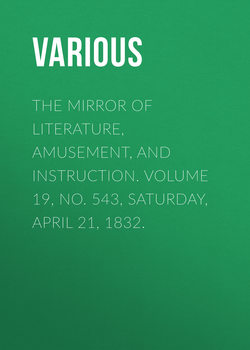Читать книгу The Mirror of Literature, Amusement, and Instruction. Volume 19, No. 543, Saturday, April 21, 1832. - Various - Страница 4
SCOTCH ECONOMY
Оглавление(To the Editor.)
The amusing letter of S.S. in No. 536, of The Mirror, has but so very recently met my eyes, that I have been obliged unavoidably to allow some weeks to elapse ere I noticed it. Indeed, to advert to it at all, I should not have considered necessary, but that your correspondent seems to imply a doubt as to the accuracy of my assertion, in the article "Shavings," (vide No. 533, p. 83.) Permit me, for the satisfaction of your readers to state, that I was no "flying tourist," when the fact of a very considerable waste of fuel in Edinburgh, (fuel which would, I thought, sell in England, if not wanted in Scotland,) came repeatedly, I may say, almost daily, under my own personal observation. A residence of two years in Edinburgh (yes, it certainly was "the Scottish capital," for I had previously resided during a longer period in the Irish one,) enabled me to state what I then beheld, with a scrutiny which certainly would not have been warranted by a mere casual visit of two days, two weeks, or two months; that the circumstance should have irritated S.S. I cannot consider any fault of mine; my statement was correct. The possibility of Irish labourers being employed to build in Scotland, as they are very generally in England, does not seem to have occurred to your correspondent; I confess it did to me, but considered, to mention it in my trifling "Domestic Hint," quite unnecessary, since, had their wastefulness been hitherto unknown to their employers, it might henceforth, if they pleased "to take a hint," be by them materially checked. In days when the complaint of poverty is universal, when the working classes find it difficult to carry on any employment which shall bring them bread, and when thousands wander over the united kingdom with no apparent means of subsistence, I did not imagine that a "Hint," as to a possible source of emolument (were it confined but to half a dozen individuals) to the poor, would be considered a meet subject for ridicule. I said, or intended to say, if shavings and loose chippings of wood are of little value for fuel in Scotland, they are acceptable in England; and why, if the proprietors of new houses choose during their erection, to save the fuel they produce, and of which I repeat I have seen vast quantities burnt, and bestow it as a charity on such persons as might think it worth acceptance for sale, "over the Border;" why they should not do so, I have yet to learn.5 However, waiving this scheme, which S.S. may be inclined to think rather Utopian, and conceding, that if Scotland needs not for fuel, her refuse chips and shavings, they would not answer in that light as a marketable commodity in the sister country, still wood and wood-ashes have become of late years, agents so valuable and important in chemistry, and other sciences and arts, as to furnish another, and all-sufficient reason why no reckless destruction should be allowed of an article, every species of which may be rendered, under some modification, of utility.
Respecting the well preserved eggs of Scotland; though S.S. is probably aware of the circumstance, yet some of your readers may not be, their sale in England (and indeed I have understood America) brings her in no inconsiderable profit. In this country they arrive, and I have my account from an eye-witness, in large deal boxes, most curiously packed, relying solely on each other for support; since, set up perpendicularly on their ends, with no straw, heather, saw-dust, or any other material to fill the interstices between them, the fate of every box of this fragile ware depends, during its journey and unlading, on the safety or fracture of a single egg; but such is the nicety and compactness of their packing, that rarely, if ever, an accident occurs.
M.L.B.
5
Footnote 5:
Has Scotland no paupers to whom the gift of wood fuel might prove acceptable, in spite of peat? We have in England abundance of wood, yet our own poor are distressed for it, glad to pick up sticks for firing, and often steal it from fences, &c. in their necessity, and the gift of wood is to them a charity, as well as that of coals. Why should aught that could he made of use, be wantonly destroyed? It is contrary to Scripture; it is in opposition to common sense.
